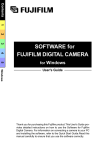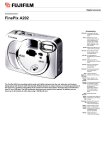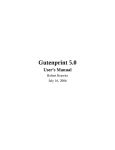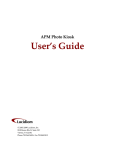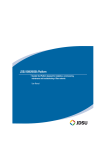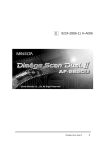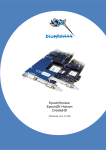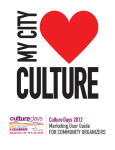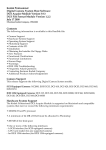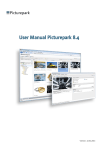Download Fujifilm NC-400D User's Manual
Transcript
DIGITAL COLOR PRINTER NC-400D PRINTER DRIVER for Windows ® USER’S MANUAL First Edition NC-400D PRINTER DRIVER for Windows® USER’S MANUAL IMPORTANT INFORMATION REGARDING THIS MANUAL • Transfer or duplication of all or any part of the content of this manual without prior authorization from Fuji Photo Film Co. Ltd is forbidden by law. • The contents of this manual are subject to change without notice. • While every care has been taken in the production of this manual, Fuji Photo Film Co. Ltd accepts no liability whatsoever for any loss incurred by the customer or by any third party resulting from errors or sample settings, etc. provided in this manual. • Microsoft® and Windows® are trademarks of the Microsoft Corporation of the U.S. registered in the U.S. and other countries. Windows is an abbreviated term referring to the Microsoft Windows Operating System. • Adobe® Acrobat® Reader™, PhotoDeluxe® and Photshop® are registered trademarks of Adobe Systems Incorporated of the U.S. • All other company or product names are registered trademarks or trademarks of the respective companies. CONVENTIONS The conventions shown below are used for the procedures described in this manual. ☞ CAUTION ✏ NOTE Points to note when using this product or information on restrictions that apply to its functions. You must read this information to ensure that you use this product correctly. Provides additional information on the use of this product. Refer to this information when you are unsure of the correct operation procedure. 2 NC-400D PRINTER DRIVER for Windows® USER’S MANUAL CONTENTS 1. Exif Viewer............................................................................... 4 1.1 1.2 1.3 1.4 INSTALLING Exif Viewer .......................................................................... 6 USING Exif Viewer ................................................................................. 7 TROUBLESHOOTING.............................................................................. 24 UNINSTALLING Exif Viewer ..................................................................... 27 2. PRINTER DRIVER...................................................................... 29 2.1 INSTALLING THE NC-400D PRINTER DRIVER ................................................ 30 2.2 USING THE NC-400D PRINTER DRIVER ....................................................... 35 2.3 UNINSTALLING THE NC-400D PRINTER DRIVER............................................. 39 3. Acrobat Reader AND PERUSAL OF MANUAL (USER'S MANUAL) .............. 42 3.1 INSTALLING Acrobat Reader.................................................................... 42 3.2 READING THE USER’S MANUAL................................................................ 43 4. TROUBLESHOOTING .................................................................. 44 APPENDIX ................................................................................. 45 3 NC-400D PRINTER DRIVER for Windows®® USER’S MANUAL 1. Exif Viewer Exif Viewer is an image viewing application that provides an Explorer-like user interface for quick and convenient browsing of image files stored in folders. Exif Viewer also features an index printing function that lets you print indexes (lists of thumbnail images) for specified images. ☞ CAUTION 1 • Windows 2000/XP users must log on using an “Administrator” account to install the software. • Windows XP provides a user switching function that allows multiple users to use the same computer at the same time. However, because the software bundled with this product does not support the user switching function, ensure that only one user is logged on when using this product. • In Windows XP, if you connect a CD-R/CD-RW drive (including Combo drives for reading DVDs) to your computer, you may be unable to view images on some CDs from Exif Viewer. Use the following procedure to view the images: Select “Properties” for the DVD/CD-RW drive in the “My Computer” window. 4 NC-400D PRINTER DRIVER for Windows® USER’S MANUAL 2 ☞ CAUTION Click the “Recording” tab. The “Enable CD Recording on this drive” checkbox should be ticked. Deselect this checkbox. Deselecting this checkbox disables the function that allows you to write data to a CD-R or CD-RW disk. When you want to write data to a CD-R or CD-RW disk, tick this checkbox again. 5 NC-400D PRINTER DRIVER for Windows® USER’S MANUAL 1.1 INSTALLING Exif Viewer 1 Load the enclosed CD-ROM into the CD-ROM drive of the Windows PC that will use the printer. The installer window automatically appears. If the installer window does not appear, run the “SETUP.exe” program on the CD-ROM. 2 Click the [Installation of ExifViewer] button and then install the software as directed by the on-screen messages. 6 NC-400D PRINTER DRIVER for Windows® USER’S MANUAL 1.2 USING Exif Viewer 1.2-1 Launching Exif Viewer and an Exif Viewer Overview 1 From the Windows Start menu, click “Programs (P)” ➔ “Exif Viewer” ➔ “Exif Viewer” to launch Exif Viewer. 2 When you select a folder in the left-hand pane, thumbnails of the images in that folder are displayed in the right-hand pane. Registered application program display area 7 NC-400D PRINTER DRIVER for Windows® USER’S MANUAL 3 When you double-click directly on one of the thumbnail images in the right-hand pane, the full-size image is displayed in its own image window. To close the image window, click the button in the top-right corner of the window. Marquee tool: Allows you to specify an area on-screen that you want to crop. Crop Image size: Rotate right Allows you to change the image size. Rotate left Hand tool Scrolls the screen display. Zoom Out Tool Shrinks the screen display. Zoom In Tool Enlarges the screen display. 4 To exit Exif Viewer, select “Exit (X)” from the “File (F)” menu or click the button in the top-right corner. 8 NC-400D PRINTER DRIVER for Windows® USER’S MANUAL 1.2-2 Viewing Images 1 Selecting the folder 2 Displaying the images Select the desired folder by clicking it in the folder tree display area in the Main Window. The images in that folder are then displayed. Clicking the to the left of the folder shows a drop-down display of the folders contained in the selected folder. To open a new window showing an image, double-click the thumbnail image in the Main Window directly or select a thumbnail and: A. Click the button, or B. Select “Open” from the “File” menu. Image Window 3 Enlarging and reducing the displayed image To enlarge or reduce the image displayed, switch to enlarged or reduced display mode by clicking the or button in the Toolbar or by selecting “Zoom In Tool (I)” or “Zoom Out Tool (O)” from the “Image (I)” menu. Clicking the mouse on the image then enlarges or reduces the image using the clicked point as the center of the image. 9 NC-400D PRINTER DRIVER for Windows® USER’S MANUAL 4 5 6 Scrolling around the image display You can use the scroll bars in the Image Window to scroll to different parts of the image. Also, by clicking the button in the Toolbar or selecting “Hand tool (H)” from the “Image (I)” menu, you can switch to the free scroll mode which allows you to move the image around inside the window by dragging it around with the mouse. Using the folder selection history Up to 20 recently selected folder names are automatically recorded. When you select a recorded folder name from the “Go (G)” menu, the images in the selected folder are displayed. Clicking the button or selecting “Back (B)” from the “Go (G)” menu displays the last folder selected before the current folder. When there is no previously selected folder, this button or menu is grayed out. If you have gone back to the previous folder, clicking the button or selecting “Forward (F)” from the “Go (G)” menu displays the next folder after the folder currently displayed. If there is no next folder, this button or menu is grayed out. Using bookmarks ■ Registering a folder in the bookmarks Selecting “Add to Bookmarks (A)” from the “Bookmarks (B)” menu registers the currently selected folder as one of the bookmarks. The name of the registered folder is used as the title. Up to 100 bookmarks may be registered. ☞ CAUTION Once 100 bookmarks have been registered, the “Add to Bookmarks (A)” menu will be grayed out and cannot be used. 10 NC-400D PRINTER DRIVER for Windows® USER’S MANUAL ■ Browsing the bookmarks Selecting a folder stored in the “Bookmarks (B)” menu displays the images in that folder. ■ Editing the bookmarks To edit the bookmarks, open the Bookmarks dialog box by selecting “Organize Bookmarks (O)” from the “Bookmarks (B)” menu. Bookmarks dialog box Title / path display: Displays the title and folder path. The title name can be modified by clicking the title. [Delete] button: Click the [Delete] button or press the Delete key to delete the selected bookmark. 11 NC-400D PRINTER DRIVER for Windows® USER’S MANUAL 7 Changing the Thumbnail Display Mode ■ To change the order in which thumbnail images are displayed Select “Arrange Thumbnails (A)” from the “View (V)” menu or “Arrange Thumbnails” popup menu and specify one of the following as the thumbnail display order. By name, type, date ■ To change the thumbnail size Select “Thumbnail Size (H)” from the “View (V)” menu or “Thumbnail Size” pop-up menu and specify one of the following as the thumbnail display size. Large (160 × 120 pixels), Medium (80 × 60 pixels), Small (40 × 30 pixels) ■ To change the thumbnail frame and background design By selecting “Customize Window (C)” from the “View (V)” menu, you can open the “Customize Window” dialog box and change the design of the thumbnail frame or Main Window background. “Customize Window” dialog box 12 NC-400D PRINTER DRIVER for Windows® USER’S MANUAL 8 Viewing the image information To view the image information, select a thumbnail and click the button or select “Information (I)” from the “File (F)” menu. The image information dialog box then appears. Image information dialog box ☞ CAUTION • Because the Exif Viewer shows the shutter speed and aperture settings using the values used by conventional cameras, the information may not match the settings used on a digital camera. • Only ASCII text characters can be entered in the copyright field. 13 NC-400D PRINTER DRIVER for Windows® USER’S MANUAL 9 Viewing a slide show When you select “Slide Show (S)” from the “File (F)” menu, the “Slide Show Setting” dialog box opens and you can run a slide show. The slide show displays the image files in the thumbnail display area. Slide Show Setting dialog box [Playback] button: Starts the slide show. [Playback interval] input field: [Playback Mode] option buttons: These can be used to select the playback mode. The available options are “Automatic” or “by Key Input”. Specifies the playback interval (in seconds) for images. This value can be specified when the “Automatic” option button is selected as the playback mode. Settings from 1 second to 30 seconds can be specified. [Play back repeatedly] check box: Click this check box when you want to play the slide show as a repeating loop. ■ Slide show playback “by Key Input” playback: If you select “by Key Input” as the playback mode and then click the “Playback” button, the first image is displayed. You then press the right arrow [→] and left arrow [←] keys to view the next and previous images respectively. ■ To end a slide show To end a slide show, click the mouse or press the [Esc]. 14 NC-400D PRINTER DRIVER for Windows® USER’S MANUAL 1.2-3 Working With Image Files 1 Selecting images Images in the Main Window can be selected in the following ways. To select one image : Clicking a thumbnail image selects the image. To select all the images : From the “Edit (E)” menu, select “Select All (A)” to select all the images in the thumbnail display area. To select multiple images using the keyboard : You can select several images by holding down the [Ctrl] key as you click the images one after the other. To select multiple images using the mouse : When you drag the mouse over the thumbnails, all the images in the drag box are selected. 2 Moving and copying images Use any of the following methods to move an image file from one location to another on the same drive. A. Drag the thumbnail image from the thumbnail display area in the Exif Viewer and drop it onto the desktop. B. Drag the thumbnail image from the thumbnail display area in the Exif Viewer and drop it onto the folder tree display area. C. Drag the image file from the desktop and drop it onto the Exif Viewer window. ✽ Images cannot be copied from the personal computer to a media loaded in the camera. If the file is dragged to a location on a different drive, the image file is copied to that drive. 15 NC-400D PRINTER DRIVER for Windows® USER’S MANUAL 3 Renaming image files You can rename an image file simply by clicking in the file name display area and typing in a new file name. ■ Automatic renaming When you select the image to be renamed and select “Automatic Rename (A)” from the “File (F)” menu, the “Automatic Rename” dialog box opens and you can specify the file name format. “Automatic Rename” dialog box This allows you to change the name of the selected file to name containing the date, time and the specified text in a single operation. “Automatic Rename” replaces the file name using the procedure shown below. For example, when the selected image was shot at 9:21 and 15 seconds on March 3, 2003, and “SAMPLE” was entered in the “User Settings” field, the new name assigned is as follows: “Date” and “Time” specified ➔ “SAMPLE2003_0303_092115AA.JPG” “Time” only specified ➔ “SAMPLE092115AA.JPG” “Date” only specified ➔ “SAMPLE2003_0303AA.JPG” Where the new file name will duplicate an existing file name, the two letters appended to the end of the name are automatically incremented alphabetically to prevent duplication. If a non-Exif image file or a file with no photography date or time information is automatically renamed, the file's time stamp is automatically used. 4 Deleting images To delete an image, select the image to be deleted and select “Delete (D)” from the “File (F)” menu or press the [Delete] key. 16 NC-400D PRINTER DRIVER for Windows® USER’S MANUAL 1.2-4 Editing Images 1 Image window To edit an image, begin by opening the image you want to edit. You can open the image for editing by either double-clicking the thumbnail image directly or by selecting the thumbnail and doing one of the following: A. Click the button. B. Select “Open (O)” from the “File (F)” menu. If an image processing application has been registered, the image is opened in the registered application. Image Window Image display area: Displays the image. Window frame: Basic information for the image is displayed in the window frame. 2 ✏ NOTE Cropping (Trimming) the image You can specify a selected portion of the image to be cropped by clicking the button in the Toolbar or by selecting “Marquee tool (M)” from the “Image (I)” menu. You can then use the mouse to move, enlarge or reduce the trimming frame that appears on the image. When you have selected the desired section of the image, click the button in the Toolbar or select “Crop (C)” from the “Image (I)” menu to trim the selection. You can cancel the last trimming operation performed by selecting “Undo (U)” from the “Edit”(E)” menu. 17 NC-400D PRINTER DRIVER for Windows® USER’S MANUAL 3 Copying the image to the clipboard 4 Changing the image size By selecting “Copy (C)“ from the “Edit (E)“ menu, you can copy the selected section of the image to the clipboard. When you click the button in the Toolbar or select “Image Size (S)” from the “Image (I)” menu, the “Image Size” dialog box opens. In this dialog box you can change the image size to a setting between 160 × 120 and 4,096 × 4,096. “Image Size” dialog box [OK] button [Unit] pop-up menu Changes the image size according to the specified values. Allows you to select pixels or percentages (%) as the unit. [Cancel] button Closes the dialog box without changing the image size. [Width] and [Height] input fields Enter the image width and height in these boxes, using the units selected from the [Unit] pop-up menu. When you enter a value in one box, the value in the other box automatically changes to maintain the aspect ratio of the image. ✏ NOTE 5 You can cancel the last image size change performed by selecting “Undo (U)” from the “Edit (E)” menu. Rotating the image You can rotate the image 90° left or right by clicking the / button in the Toolbar or by selecting “Rotate Left (L)/ Rotate Right (R)” from the “Image (I)” menu. 18 NC-400D PRINTER DRIVER for Windows® USER’S MANUAL 6 Saving the image When you click the button or select “Save As (A)” from the “File (F)” menu, the “Save As” dialog box appears. Use this dialog box to specify the file format and destination folder before saving the image. “Save As” Dialog Box ☞ Exif Viewer can save the following file formats: Exif-JPEG, Exif-TIFF, BMP. CAUTION 7 Registering an image viewing application When you open an image using the default software settings, it is displayed by Exif Viewer. To use a pre-installed image viewing application, drag the application’s file icon or its shortcut and drop it in the registered application program display area (see P.7). The application then becomes the registered image viewing application and from that point on is used to display the image when an image is opened. To remove a registered application, select “Remove Registered Application (R)” from the “File (F)” menu or drag the registered application’s icon out of the registered application area and drop it onto the desktop. 19 NC-400D PRINTER DRIVER for Windows® USER’S MANUAL 1.2-5 Printing the image 1 2 Page setup When you select “Page Setup (T)” from the “File (F)” menu, the standard “Page Setup” dialog box appears. You can use this dialog box to specify parameters such as the paper size and orientation. Printing When you select the image and click the button or select “Print (P)” from the “File (F)” menu, the standard “Print” dialog box for the Printer set as default appears. You can print the image from this dialog box. Print dialog box “Center Image” check box: Click this box to position the printed image in the center of the paper. When this box is not checked, the image is printed in the top left corner of the page. “Adjust to paper size” check box: Click this check box to print the image so that it fills the page. When this box is not checked, the image is printed using the original image dimensions. “Adjust to paper size” option buttons: These options are available when the “Adjust to paper size” check box is checked. • Print entire image at maximum size (margins added) This option prints the image enlarged or reduced with the aspect ratio maintained so that none of the image overlaps the page. The image is not trimmed. • Print entire printable area (image cropped) This option prints the image enlarged or reduced so that it fills the printable area on the page, while maintaining the aspect ratio of the image. Portions of the image that overlap the page are trimmed off. “Date imprinting” checkbox: Click this checkbox to imprint the date on your image. ✽ The “Print” dialog box displayed by the [Properties] button differs depending on the printer driver you are using. ✽ Items other than the “Center Image” check box, “Date imprinting” check box, “Adjust to paper size” check box and option buttons, and the [Preview] button all vary depending on the printer driver you are using. 20 NC-400D PRINTER DRIVER for Windows® USER’S MANUAL [Preview] button: Click this button to see a preview of the image to be printed. [Cancel] button: Click this button to stop printing and close the “Print” dialog box. [OK] button: Click this button to start printing using the currently selected settings. 21 NC-400D PRINTER DRIVER for Windows® USER’S MANUAL 3 Printing an index If you select several images and then select “Index Print (N)” from the “File (F)” menu, the “Index Print” dialog box opens. You can then use this dialog box to print an index of the images. “Index Print” dialog box [Number of Frames]: Specifies the number of frames vertically and horizontally. Click the [▲] and [▼] buttons to change the number of frames printed. ✽The “Print” dialog box displayed by the [Properties] button differs depending on the printer driver you are using. [Preview] button: Click this button to see a preview of the images to be printed. [Cancel] button: Click this button to stop printing and close the “Index Print” dialog box. [OK] button: Click this button to start printing using the currently selected settings. 22 NC-400D PRINTER DRIVER for Windows® USER’S MANUAL 1.2-6 Exiting Exif Viewer To exit Exif Viewer, select “Exit (X)” from the “File (F)” menu or click the button in the top-right corner in the Main Window. 23 NC-400D PRINTER DRIVER for Windows® USER’S MANUAL 1.3 TROUBLESHOOTING ■ Problems with Exif Viewer Message Folder not found. Cause Solution You were working with a folder on a removable disk and the disk has been removed. Re-insert the disk. The folder you were working with has been deleted or moved. Use the ”Refresh” menu. “Filename” not found. You were working with a file on a removable disk and the disk has been removed. Re-insert the disk. This file format cannot be used. A file with a format not supported by Exif Viewer was accessed. Use a file format supported by Exif Viewer (Exif-JPEG, Exif-TIFF, JPEG (baseline only), BMP). The file with the same name as “filename” already exists. Overwrite? The folder on which you dropped the file already contains another file with the same name. To avoid overwriting the existing file, rename the file being dropped or rename the file in the target folder. The folder with the same name as “filename” already exists. The folder on which you dropped the file already contains a folder with the same name. Rename the file being dropped or rename the folder in the target folder. Disk or folder is writeprotected. The folder or disk to which you attempted to write the file is write-protected. Remove the write-protection from the disk or folder. Some digital camera models do not have a Write function. Specify another writable disk as the save destination for the image data. Alternatively, copy the image data in the camera to another writable disk and then process the copied data. 24 NC-400D PRINTER DRIVER for Windows® USER’S MANUAL Message Cause Solution Insufficient disk capacity. Process aborted. There is not enough available disk space. Switch to a new disk, or create space by deleting some unneeded files on the disk. Cannot move “filename”. Copy? The file you attempted to move is on a write-protected disk. Remove the write-protection from the disk. The file you attempted to move is being used by another application. Quit the application that is using the file. “Filename” is in use. The selected file is being used by another application. Quit the application that is using the file. The files may not be used correctly. OK? A file with the same file number already exists in the write destination. Change the number of the file being written. File is locked. An attempt was made to modify a write-protected file. Open the file properties and uncheck the “Read-only” attribute. “Filename” is broken or not in the usable format. The attempt to read the file failed. This file is not supported by Exif Viewer and cannot be used. Window cannot be opened any more. No more than 20 windows can be opened. To open the images in a window, select no more than 20 images. Filename includes an illegal character. The filename contains a character that cannot be used (“\”, “/”. “?”, etc.). Delete the illegal character. The file with the same name already exists. A file exists with the filename you entered. To avoid duplicating an existing file name, use a different file name. Image size is smaller than the specified size. This image size cannot be saved in the Exif format. Save the image as a BMP file. Automatic rename failed. Process aborted. The duplication of filename could not be avoided as there are too many images with the same date and time. Reduce the number of files processed by the Automatic Rename function. 25 NC-400D PRINTER DRIVER for Windows® USER’S MANUAL Message Cause Solution Part of “filename” will be cropped because the image is larger than the printer output size. The image in the file being printed is bigger than the paper size. Print using the “Adjust to paper size” option. Registered application not found. The registered application has been deleted or moved. Re-register the application. Could not execute the registered application. The application is damaged. Re-install the application or register another application. Could not create a temporary file. Process aborted. A temporary file could not be created when an Exif-TIFF-YC file was opened as there was insufficient disk space. Increase the amount of space available on the disk on which Exif Viewer is installed. Printer not found. No printer is selected. Specify the printer in the [Settings (S)] - [Printers (P)] menu. 26 NC-400D PRINTER DRIVER for Windows® USER’S MANUAL 1.4 UNINSTALLING Exif Viewer 1 2 3 Quit all the currently running applications. 4 The “Add/Remove Programs Properties” window appears. Select the software to be uninstalled (Exif Viewer) and then click the [Add/Remove] button. Close all the files. Open the “My Computer” window and double-click “Add/Remove Programs” in the Control Panel. 27 NC-400D PRINTER DRIVER for Windows® USER’S MANUAL 5 When the confirmation message appears, click the [Yes] button. Check your selection carefully since the process cannot be cancelled once you click the [Yes] button. 6 Automatic uninstallation begins. When uninstallation ends, click the [OK] button. 28 NC-400D PRINTER DRIVER for Windows® USER’S MANUAL 2. PRINTER DRIVER The specifications for the NC-400D printer driver are given below. ● Compatible printers FUJIFILM Printpix DIGITAL COLOR PRINTER NC-400D ● PC requirements RAM: Minimum 96 MB (128 MB or better recommended) Hard disk space: Minimum 100 MB CD-ROM drive SCSI interface ● Compatible operating systems Windows 98 (Service pack should be used) Windows 98 Second Edition Windows Millennium Edition Windows 2000 Professional Windows XP Home Edition Windows XP Professional ☞ CAUTION Windows 2000/XP users must log on using an Administrator account to install the software. Windows XP provides a user switching function that allows multiple users to use the same computer at the same time. However, because the software bundled with this product does not support the user switching function, ensure that only one user is logged on when using this product. ● Supported printer connection modes NC-400D printer connected to the PC's SCSI interface ● Number of printers supported Up to 7 NC-400D printers can be concurrently registered and used with 1 PC. ● Functions • Paper size selection • Layout setting • Enlargement/reduction scale setting • Print quality adjustment setting • Noise reduction setting 29 NC-400D PRINTER DRIVER for Windows® USER’S MANUAL 2.1 ☞ CAUTION INSTALLING THE NC-400D PRINTER DRIVER Do not use the Add Printer wizard in the Windows printer folder to install the printer driver. The driver must be installed from the menus provided on the enclosed CDROM. 1 2 3 Quit all the applications currently running on Windows. 4 5 6 If the “Add New Hardware Wizard” starts up, click the [Cancel] button. Check that the NC-400D is correctly connected to the PC's SCSI interface and that it is switched on. If the NC-400D is not connected or is not switched on, switch off the PC, connect the NC-400D and switch it on before start up the PC again. Load the enclosed CD-ROM into the PC's CD-ROM drive. The main menu appears. If the main menu does not appear, run the “SETUP.exe” program on the CD-ROM. 30 NC-400D PRINTER DRIVER for Windows® USER’S MANUAL 7 Click the [Installation of Printer Driver] button. 8 The window for entering the printer’s SCSI host appears. To use automatic printer detection, click the [Reference...] button. To specify the settings manually, enter the value directly and then click the [OK] button. Then proceed to step 10. 31 NC-400D PRINTER DRIVER for Windows® USER’S MANUAL 9 A list of the connected printers is displayed. Select the printer to be used and click the [OK] button. 10 The SCSI host for the NC-400D is entered automatically. Click the [OK] button. 32 NC-400D PRINTER DRIVER for Windows® USER’S MANUAL 11 The window for entering the printer's registration name appears. Enter the registration name you want to use in place of the displayed name. If you want to use the displayed name, simply click the [OK] button. If you entered a printer name that has already been used, the message shown below appears. Click the [OK] button and enter the printer name again. 33 NC-400D PRINTER DRIVER for Windows® USER’S MANUAL 12 If there is a printer driver already installed on the PC, one of the messages shown below appears. Click the [OK] button or [Cancel] button. If you clicked the [OK] button, register the additional printer by repeating the procedure on page 31 from step 8 onwards. If you clicked the [Cancel] button, printer driver installation is cancelled. 13 When installtion is completed, dialog box shown below appears. <When restarting is required> 34 <When restarting is not required> NC-400D PRINTER DRIVER for Windows® USER’S MANUAL 2.2 ☞ CAUTION ✏ NOTE 1 USING THE NC-400D PRINTER DRIVER The NC-400D printer driver provides functions that allow you to use your printed images in a variety of ways. Depending on the software application that is using the printer driver, enabling these function settings may result in printed images that differ from what is shown on your screen. When printing images from an application that allows you to specify the image resolution, set the resolution to 11.8 dot/mm (300 dpi). Set up the printer driver. Right-click the registered printer in the Printers folder and select “Properties” from the pop-up menu to set up the printer driver. In Windows 2000 or Windows XP, select the “General” tab in the Properties window and click the [Printing Preferences] button. ☞ CAUTION • Some software applications allow you to temporarily change the settings by clicking the [Properties] button when you print. When you do this, the temporary settings only apply to that application. • When you temporarily change the settings from a software application, the changed settings may not be reflected correctly. If this occurs, change the settings in the Printers folder before you launch the application. 35 NC-400D PRINTER DRIVER for Windows® USER’S MANUAL 2 ☞ CAUTION 3 The NC-400D printer properties window appears. Specify the settings in the “Paper” and “Adjustment” tabs. The number of tabs displayed in addition to “Paper” and “Adjustment” varies depending on your PC hardware and software. Specify the “Paper” tab settings. [Paper Size selection] The available paper sizes are as follows: 4" × 6" Size 6" × 8" Size Free Size When 4" × 6" Size is selected, the paper is cut to 102 × 148 mm, and when 6" × 8" Size is selected, the paper is cut to 148 × 203 mm. When you select Free Size, you can select any paper size between 148 × 58 mm and 148 × 204 mm. 36 NC-400D PRINTER DRIVER for Windows® USER’S MANUAL ☞ CAUTION If you are using a software application that allows you to select the paper size when you print, specify the NC-400D as the printer to be used, list the NC-400D paper sizes and then select the paper size. If you are using the “Free Size” setting, rightclick the NC-400D icon in the Printers folder and select the desired paper length in the “Properties” tab before selecting the paper size. [Layout setting] The available print orientation settings are as follows: “Portrait” “Landscape” To print a wide-angle shot so that it fills the paper, select “Landscape”. ☞ CAUTION When you use the “Free Size” setting, note that 6" × 8" Size images will also have the same orientation. [Rate of enlargement/reduction setting] This allows you to specify the enlargement or reduction scale for an image. The range of available scales is as follows: 20% to 400% ☞ Images larger than 3300 × 2200 pixels cannot be enlarged. CAUTION 4 Specify the “Adjustment” tab settings 37 NC-400D PRINTER DRIVER for Windows® USER’S MANUAL [Print quality adjustment setting] To obtain a better quality print of a photographic image, you can specify print quality adjustment. The available settings are as follows: “Enable” “Disable” If you have used an image editing application to modify an image or deliberately altered the photography settings for an image, print the image with “Automatic print quality adjustment” set to “Disable”. Regardless of whether “Enable” or “Disable” is selected as the “Automatic print quality adjustment” setting, you can still adjust the quality by manually selecting the settings for cyan, magenta, yellow and sharpness in “Print quality adjustment”. [Noise reduction setting] This setting allows you to apply noise reduction during print output. To use noise reduction processing, put a tick in the Noise reduction checkbox. 5 Once you have specified the various settings, enable the NC-400D printer driver by specifying the NC-400D from the software application when you print. 38 NC-400D PRINTER DRIVER for Windows® USER’S MANUAL 2.3 UNINSTALLING THE NC-400D PRINTER DRIVER 1 2 3 4 5 Switch off the PC and disconnect the NC-400D. 6 If you are using Windows 98, 98 SE or Me, double-click [Uninstall.exe] in the “Win9x” folder inside the “NC400” folder on the CD-ROM. Switch your PC on. Quit any application programs that are currently running. Load the enclosed CD-ROM into the PC’s CD-ROM drive. When the main menu appears, click the [Quit] button to exit the menu. If you are using Windows 2000, double-click [Uninstall.exe] in the “Win2k” folder inside the “NC400” folder on the CD-ROM. If you are using Windows XP, double-click [Uninstall.exe] in the "Winxp" folder inside the “NC400” folder on the CD-ROM. 39 NC-400D PRINTER DRIVER for Windows® USER’S MANUAL 7 A window appears asking for confirmation. Click the [OK] button. 8 If other FUJIFILM printer drivers are installed, one or more of the messages shown below may appear. Click the [No] button. 40 NC-400D PRINTER DRIVER for Windows® USER’S MANUAL 9 When uninstallation is completed, the dialog box shown below appears. <When restarting is required> <When restarting is not required> Click the [Yes] button. Click the [OK] button. 41 NC-400D PRINTER DRIVER for Windows® USER’S MANUAL 3. Acrobat Reader AND PERUSAL OF MANUAL (USER'S MANUAL) To read the PDF-format user’s manual, Adobe Systems’ Acrobat Reader must be installed on the PC. If Acrobat Reader is already installed on the PC, you can omit the Acrobat Reader installation. 3.1 INSTALLING Acrobat Reader 1 2 3 Load the enclosed CD-ROM into the PC’s CD-ROM drive. 4 Proceed with the installation as directed by the on-screen instructions. The main menu appears. If the main menu does not appear, run the “SETUP.exe” program on the CD-ROM. Click the [Installation of Acrobat Reader] button. 42 NC-400D PRINTER DRIVER for Windows® USER’S MANUAL 3.2 1 2 READING THE USER’S MANUAL Click the [Perusal of manual] button. Acrobat Reader starts up and the “USER'S MANUAL” appears. 43 NC-400D PRINTER DRIVER for Windows® USER’S MANUAL 4. TROUBLESHOOTING Problem Check this Solution Is the printer switched on? Is the printer’s “POWER” Lamp lit? If not, switch the printer on. Is the printer connected to the PC? Is the printer connected to the PC via the SCSI cable provided? If not, switch the PC and printer off and connect both ends of the cable properly. The printer suddenly stopped printing. Did you apply the Service Pack to your system software? When you apply the Service Pack to your system software, the port used for printer connection may be renamed. See section 2-1 (P.30-34) for information on reregistering the printer. I can’t select the paper. Have you used the “Rate of enlargement/reduction” setting while using Microsoft Word? (see P.36) The upper limit for the paper sizes that can be used with Microsoft Word is 558.7 mm and the lower limit is 2.6 mm. If the enlarged or reduced image exceeds these limits, the paper cannot be selected. See “Limits for Word” in the Word help file for details. I can’t view images on some CDs from Exif Viewer. Is CD-R/CD-RW drive (including combo drives for reading DVDs) connected to your computer? See section 1 (P.4-5). I can’t print. 44 NC-400D PRINTER DRIVER for Windows® USER’S MANUAL APPENDIX BMP (bitmap) Standard format for image data in Windows. The file extension for bitmap files is “.bmp”. Exif A full-color image format for digital still cameras. This format is compatible with TIFF and JPEG and is supported by most image processing software. This format stipulates the recording method for thumbnail images and camera information. JPEG The standardization of still image compression technology, or the standard itself. JPEG allows effective image compression. However, because some of the original image data is lost during compression, the image generated from the expanded data is not precisely the same as the original image, though the degree of variance differs depending on the compression ratio. Compression ratios vary from 10:1 to 100:1. TIFF-YC A TIFF recording format. Application software Software used for a specific purpose, such as word processing, spreadsheets or graphics. Install The process of setting up software on a PC. In most cases, software installation comprises the copying of the software from CD-ROM to the hard disk in a PC. Clipboard A location used to temporarily store cut or copied data. Data in the clipboard can be pasted into other applications. However, the data cannot be pasted into applications that do not support the data format. Grayed out A status used for menu items and buttons that are displayed in pale gray and cannot be selected. Thumbnail A small copy of an image. Automatic Rename The automatic assigning of names to files. In Exif Viewer, when multiple images are automatically renamed at the same time, filenames are assigned based on the date and time of photography. 45 NC-400D PRINTER DRIVER for Windows® USER’S MANUAL Scroll bar Bars that allow you to move an image up, down, left and right in small increments so that portions not shown in the window can be viewed. Dialog box A window used for specifying settings. Time stamp The time stamp records the date on which a file was last updated. Drive A peripheral device used by PCs to store files. Drag The action of moving the mouse with the mouse button held down. Drag and drop The process of clicking the mouse on an icon or thumbnail, holding the mouse button down as the mouse is moved to another location, and then releasing the mouse button to “drop” the icon or thumbnail. This procedure can be used to move or copy files. Cropping (Trimming) The action of cutting off unwanted portions of an image. Pixel Equivalent to picture element or dot. The minimum unit used in computer graphics. File number The final 4 digits used in the filenames for images shot on DCF-compliant digital cameras. DCF is a standard image format for digital cameras. This format allows image files to be exchanged easily among DCF-compliant cameras and printers. Folder tree An hierarchical structure for folders containing files. Preview An image displayed as it will be printed. Pop-up menu A type of menu. When clicked, it displays a list of selections. Removable disk Media that can be removed, including floppy disks, MO disks and Zip cartridges. 46 26-30, Nishiazabu 2-chome, Minato-ku, Tokyo 106-8620, Japan SR00979-00 (1) FGS-204111-SZ















































